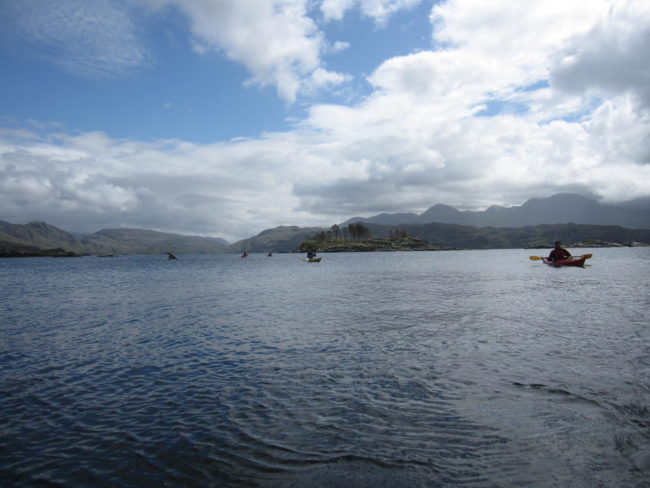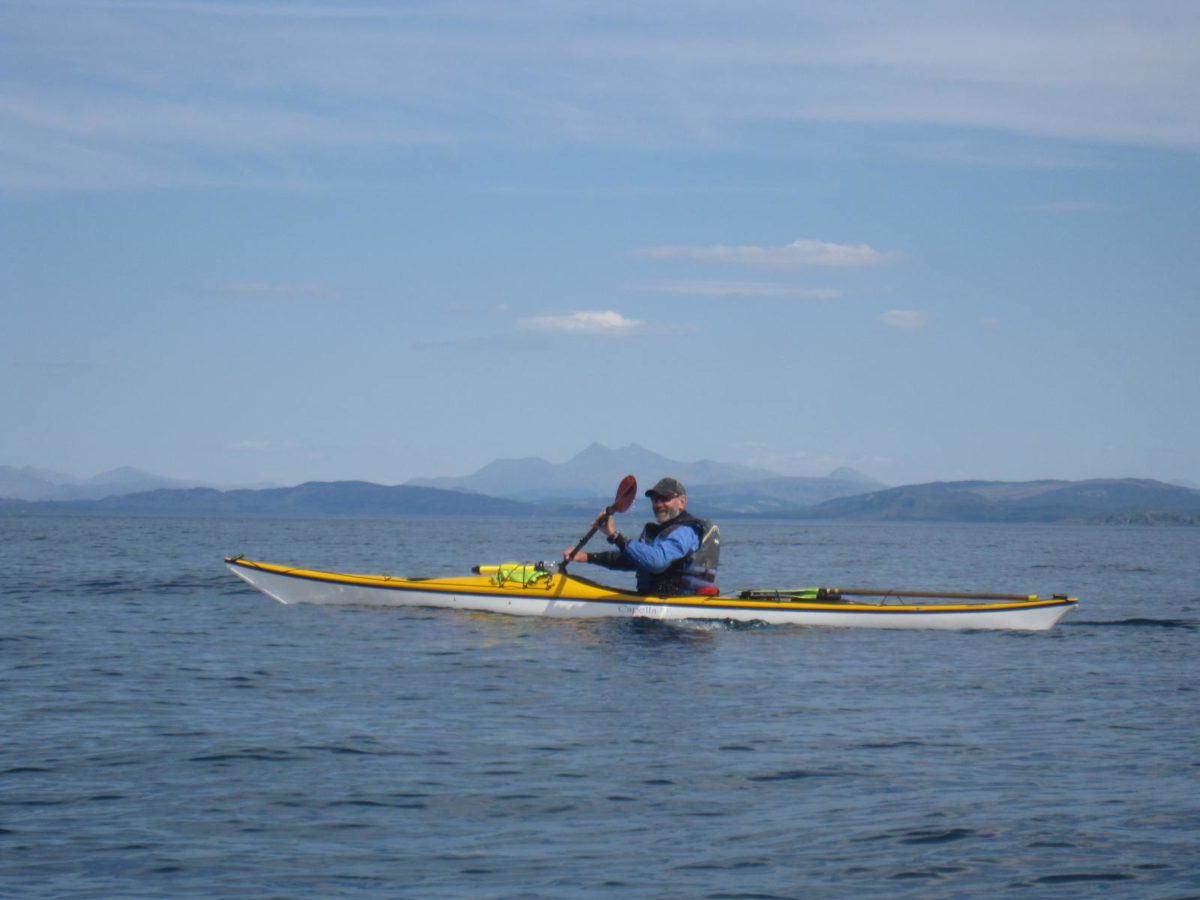Bendoran Watersports
Bendoran Watersports is a Community Interest Company founded in 2020 by Jonathan (Jon) Lloyd that offers sea kayaking and dinghy sailing based on the Isle of Mull.
As a social enterprise, Bendoran Watersports provides a facility for visitors to the Isle of Mull to enjoy and explore the area in a unique way whilst increasing employment prospects and income for local people by offering training and educational courses and workshops. Through watersports, Bendoran aims to increase the well-being of people living on the Ross of Mull and Iona, by facilitating meaningful connections and activities.

We caught up with Jon to find out more about his inspiration and ambition for Bendoran Watersports.
(All opinions shared within this case study are by those interviewed and do not reflect the position of Firstport.)
Can you tell us about Bendoran Watersports and the impact it has within the community?
Bendoran Watersports is a small sea kayaking and dinghy sailing operation based on the incredibly beautiful south west tip of the Isle of Mull and its function is to provide opportunities for all people in our community to get out on the water and gain the social, mental physical benefits that come from that. We run 2 weekly sessions, one for anyone who fancies coming along, and a separate session specifically for teenagers. Its great – we sometimes get 12 – 15 people on the water – it’s a chance to chat, unwind, be mindful and learn about the beautiful environment we live in. To support the social function we deliver guided sea kayaking and sailing trips to visitors in the summer season. We started in October 2020 and managed to get the funding we needed for kit and start up costs so that we could begin to deliver our first sessions in June 2021 as lockdown restrictions lifted.
Why did you choose to set Bendoran Watersports up as a social enterprise?
We operate from an old boatyard that was purchased by the local community through the Scottish Landfund, it made sense to be a social enterprise. The facility is currently used for a variety of community projects including us and a community seaweed farm. In addition, working with the community is a fundamental goal for me personally, being a social enterprise was a no brainer. For over 30 years I have provided outdoor and watersports training and courses to help people pursue personal development, the social benefits of setting up as a community interest company were as important as the commercial reasons.
Why did you decide on becoming a Community Interest Company (CIC) and where do you think deciding on a legal structure fits when starting out as a social enterprise?
We are a CIC limited by guarantee – there are no shareholders and the assets – for us – kayaks, sailing boats, wet suits and all our other equipment are all set to be given a local water-sports club if the we fold. We did consider other legal structure such as a CIC limited by shares or just becoming a limited company. The advantages of being limited by shares or a limited company seemed to be that it would be possible to take additional money out of the business if we were profitable and that on retirement I could sell the business. I didn’t do that for 2 reasons – firstly, I wanted the enterprise to be clearly seen as “not-for-profit” by the local and wider community. Secondly, my perception is that it is much easier to get funding if the structure clearly shows there is no personal gain from grants being offered to the enterprise. My feeling is that grant givers may even prefer to give money to CICs that are limited by guarantee over charities because we are engaging in commercial operations, meaning we’re likely to become more economically and socially more sustainable in the future.
In addition to having a legal structure, a social enterprise requires setting up a board, how did you decide on who to have on your board, and what was the process that helped you decide?
In the beginning I didn’t want to have a board, I wanted to be able to make quick decisions and without having to go lengthy discussions. However, I needed advice, so I approached; Firstport, The Social Enterprise Academy and my friends who had worked with Firstport previously to build their own social enterprise. Their support was crucial as it gave me a kick on the backside and got me on the right track. I received excellent help with technical information, cash flows, how to set up social media and business support. After the first year, it became clear that I needed more help, I really thought about the expertise I needed to consolidate the enterprise and hire a board. Having not grown up with social media, I approached someone with experience in social media marketing and business development to help me promote the vacancies.
Setting up a social enterprise, like many other businesses, requires hiring staff or volunteers – how did you find this process and what challenges did you face when handing over some of the responsibility?
Operating within a small rural community, hiring staff and volunteers can be hard, the work force pool is small and although the right skills are out there it’s hard to encourage others to volunteer when the majority of people on the island have their own businesses or projects. In addition, it’s really hard to get people in from the mainland as there is very little accommodation for workers – its all currently being used as holiday lets. What I have done is take on some youngsters as trainees and paid them on a casual basis when I can – finding the time to do training in a busy season is also hard.
You have received Start It and Build It awards and support from Firstport, how did this help you in your journey?
The support from Firstport has been invaluable – without it Bendoran Watersports would not have got off the ground. I have worked for charities for many years, therefore I don’t have much capital behind me – the awards from Firstport paid for my start up costs and the business support got me knowledge in areas in which I was weak in such as cash flow and marketing.

It is often assumed that social enterprises are not for profit and that some services should be provided free of charge. Can you share your thoughts on approaching profit-making and how focusing on profit can further your social impact?
My social enterprise is in two parts – it has a commercial side which is sea kayak guiding aimed at tourists visiting Mull, and social side which is supports the local community’s well-being through water-sports. I currently do not charge the local population – some people say I should, it is a difficult one. My feeling is that I am supported with funding from Firstport and others to make a difference in our community therefore I am paying back that support through free sessions. Although it’s not entirely my focus to become completely profit orientated, I need to break even to continue to do the work, pay wages and make a surplus to invest in the enterprise. I need to be competitive, market well and provide a great professional service.
As a social enterprise based in rural Scotland, what are the challenges you have faced, in particular during a time of difficulty such as the recent pandemic?
Operating within a remote location means poor connectivity – broadband speeds here are less than 2mbs sometimes, 4G is poor which means clients can struggle to find our location. The lack of a local workforce and limited accommodation for staff/directors means you often have to look towards the mainland for online for professional services such as accountancy and marketing. During the pandemic we were luckier than most because of low infection levels and we provide an outdoor service.
However, it’s gorgeous here! and it’s great community where people look out for each other and have the time to stop and chat (at least in winter!) I wouldn’t be anywhere else.
To discover more about Bendoran Watersports and how book expeditions and retreats visit their website https://bendoranwatersports.co.uk/ and follow them on Facebook here
